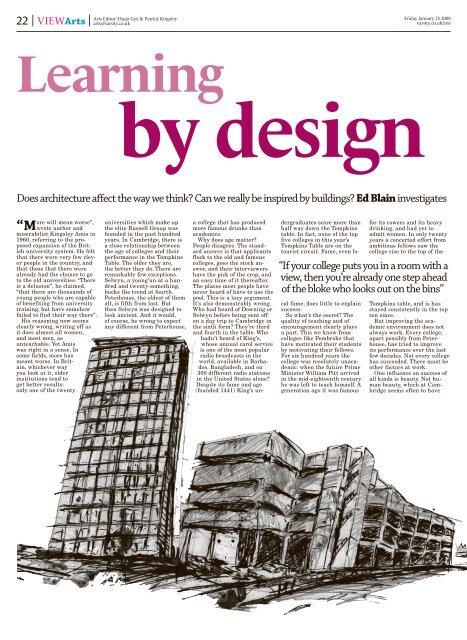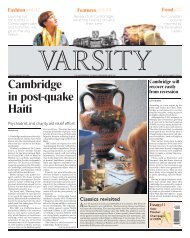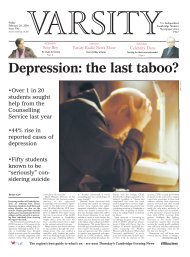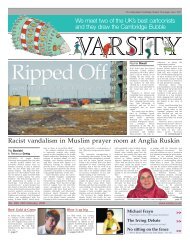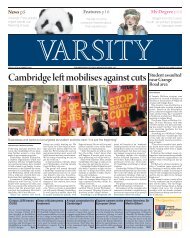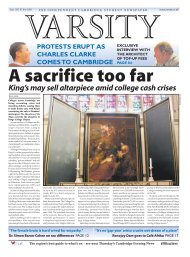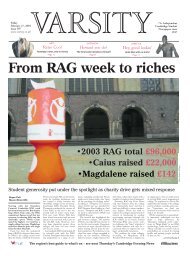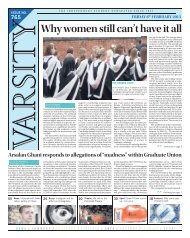Food & Drink Face Off Interview - Varsity
Food & Drink Face Off Interview - Varsity
Food & Drink Face Off Interview - Varsity
You also want an ePaper? Increase the reach of your titles
YUMPU automatically turns print PDFs into web optimized ePapers that Google loves.
Arts Editor: Hugo Gye & Patrick Kingsley<br />
22 VIEWArts arts@varsity.co.uk<br />
Friday January 25 2008<br />
varsity.co.uk/arts<br />
Learning<br />
by design<br />
Does architecture affect the way we think Can we really be inspired by buildings Ed Blain investigates<br />
ore will mean worse”,<br />
“Mwrote author and<br />
miserabilist Kingsley Amis in<br />
1960, referring to the proposed<br />
expansion of the British<br />
university system. He felt<br />
that there were very few clever<br />
people in the country, and<br />
that those that there were<br />
already had the chance to go<br />
to the old universities. “There<br />
is a delusion”, he claimed,<br />
“that there are thousands of<br />
young people who are capable<br />
of benefiting from university<br />
training, but have somehow<br />
failed to find their way there”.<br />
His reasoning now seems<br />
clearly wrong, writing off as<br />
it does almost all women,<br />
and most men, as<br />
unteachable. Yet Amis<br />
was right in a sense. In<br />
some fields, more has<br />
meant worse. In Britain,<br />
whichever way<br />
you look at it, older<br />
institutions tend to<br />
get better results:<br />
only one of the twenty<br />
universities which make up<br />
the elite Russell Group was<br />
founded in the past hundred<br />
years. In Cambridge, there is<br />
a close relationship between<br />
the age of colleges and their<br />
performance in the Tompkins<br />
Table. The older they are,<br />
the better they do. There are<br />
remarkably few exceptions.<br />
Selwyn, a young’un at a hundred<br />
and twenty-something,<br />
bucks the trend at fourth.<br />
Peterhouse, the oldest of them<br />
all, is fifth from last. But<br />
then Selwyn was designed to<br />
look ancient. And it would,<br />
of course, be wrong to expect<br />
any different from Peterhouse,<br />
a college that has produced<br />
more famous drunks than<br />
academics.<br />
Why does age matter<br />
People disagree. The standard<br />
answer is that applicants<br />
flock to the old and famous<br />
colleges, goes the stock answer,<br />
and their interviewers<br />
have the pick of the crop, and<br />
an easy time of it thereafter.<br />
The places most people have<br />
never heard of have to use the<br />
pool. This is a lazy argument.<br />
It’s also demonstrably wrong.<br />
Who had heard of Downing or<br />
Selwyn before being sent off<br />
on a day trip to Cambridge in<br />
the sixth form They’re third<br />
and fourth in the table. Who<br />
hadn’t heard of King’s,<br />
whose annual carol service<br />
is one of the most popular<br />
radio broadcasts in the<br />
world, available in Barbados,<br />
Bangladesh, and on<br />
300 different radio stations<br />
in the United States alone<br />
Despite its fame and age<br />
(founded 1441) King’s undergraduates<br />
score more than<br />
half way down the Tompkins<br />
table. In fact, none of the top<br />
five colleges in this year’s<br />
Tompkins Table are on the<br />
tourist circuit. Fame, even local<br />
fame, does little to explain<br />
success.<br />
So what’s the secret The<br />
quality of teaching and of<br />
encouragement clearly plays<br />
a part. This we know from<br />
colleges like Pembroke that<br />
have motivated their students<br />
by motivating their fellows.<br />
For six hundred years the<br />
college was resolutely unacademic:<br />
when the future Prime<br />
Minister William Pitt arrived<br />
in the mid-eighteenth century<br />
he was left to teach himself. A<br />
generation ago it was famous<br />
for its rowers and its heavy<br />
drinking, and had yet to<br />
admit women. In only twenty<br />
years a concerted effort from<br />
ambitious fellows saw the<br />
college rise to the top of the<br />
“If your college puts you in a room with a<br />
view, then you’re already one step ahead<br />
of the bloke who looks out on the bins”<br />
Tompkins table, and is has<br />
stayed consistently in the top<br />
ten since.<br />
But improving the academic<br />
environment does not<br />
always work. Every college,<br />
apart possibly from Peterhouse,<br />
has tried to improve<br />
its performance over the last<br />
few decades. Not every college<br />
has succeeded. There must be<br />
other factors at work.<br />
One influence on success of<br />
all kinds is beauty. Not human<br />
beauty, which at Cambridge<br />
seems often to have


